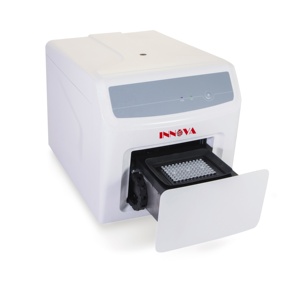Phổ biến trong ngành của bạn

Máy làm sạch siêu âm chất lượng cao esebio cho phòng thí nghiệm
60,00 US$ - 280,00 US$
Đơn hàng tối thiểu: 1 Bộ


Stomacher Sinh Thái Thân Thiện Với Phòng Thí Nghiệm Sử Dụng Nhựa Y Tế Phòng Thí Nghiệm Máy Xay Sinh Tố Tiệt Trùng Lấy Mẫu Túi Cho Hóa Học Phòng Thí Nghiệm
0,04 US$
Đơn hàng tối thiểu: 100 Hộp các tông

Máy LắC Tuyến Tính Và Quỹ Đạo Phòng Thí Nghiệm ECO 40-200Rpm Dụng Cụ Phòng Thí Nghiệm Với Giá Rẻ
72,00 US$ - 120,00 US$
Đơn hàng tối thiểu: 1 Bộ

Núm vú cao su được sử dụng trong phòng thí nghiệm với ống nhỏ giọt để phân phát giọt hoặc lượng chất lỏng hoặc hóa chất.
10,00 US$
Đơn hàng tối thiểu: 500 Gói

Giá Đựng Ống Nghiệm Bằng Acrylic 24 Lỗ Giá Đựng Ống Nghiệm Cho Phòng Thí Nghiệm
2,00 US$ - 5,50 US$
Đơn hàng tối thiểu: 500 Cái

VM-80 Phòng Thí Nghiệm Dọc Luân Phiên Mixer Cho Máu Trộn
290,00 US$ - 390,00 US$
Đơn hàng tối thiểu: 1 Bộ

Chất lượng tốt nhất parafilm pm996 phòng thí nghiệm Nguồn cung cấp 4 inch 125 ft nước bằng chứng nhanh chóng niêm phong độ ẩm bằng chứng phim 10cm 38m
16,00 US$ - 18,00 US$
Đơn hàng tối thiểu: 24 Cuộn

BIOBASE Trung Quốc Phòng Thí Nghiệm Bảng Cân Bằng Cho Thẩm Mỹ Phòng Thí Nghiệm Giao Diện Điều Khiển Bảng Cân Bằng Sản Phẩm Nhà Sản Xuất
150,00 US$ - 500,00 US$
Đơn hàng tối thiểu: 2 Đơn vị

Bán Buôn 20 Mảnh Nhựa Lưu Trữ Khay Cho Kính Hiển Vi Slide Nhà Máy Giá Phòng Thí Nghiệm Nguồn Cung Cấp Nhà Sản Xuất Công Ty
1,00 US$ - 2,30 US$
Đơn hàng tối thiểu: 2000 Cái

Phòng thí nghiệm sử dụng 45mm 60mm 90mm xem kính thủy tinh bốc hơi món ăn
0,20 US$ - 5,00 US$
Đơn hàng tối thiểu: 100 Cái

Mở đầu chuông Jar với Stopper cho phòng thí nghiệm sử dụng
20,00 US$ - 40,00 US$
Đơn hàng tối thiểu: 10 Cái

IKEME Màng Lọc Vi Xốp Sợi Thủy Tinh 25Mm 45Mm Phòng Thí Nghiệm Màng Lọc Sợi Thủy Tinh 0,22um 0,45um
Sẵn sàng vận chuyển
4,88 US$ - 5,88 US$
Đơn hàng tối thiểu: 1 Hộp
Vận chuyển mỗi chiếc: 12,80 US$
Các tìm kiếm liên quan:
sản phẩm phòng thí nghiệm sinh tháilabl dệtphòng thí nghiệm thực phẩmphòng thí nghiệm ngũ cốcphòng thí nghiệm chai sinh tháicung cấp phòng thí nghiệmkhay phòng thí nghiệm nha khoaphòng thí nghiệm chaitấm phòng thí nghiệmgiá phòng thí nghiệm báo chí nóngphòng thí nghiệm sinh thái pearsonphòng thí nghiệm khai thácphòng thí nghiệm batuphòng thí nghiệm nãogiá phòng thí nghiệm hàng đầu

Haiju Phòng Thí Nghiệm Nhà Máy Bán Hàng 100*100 Mm Tay Nhôm Có Thể Điều Chỉnh Phòng Thí Nghiệm Jack Oxit Nhôm Nâng Bảng Cho Phòng Thí Nghiệm
6,40 US$ - 7,50 US$
Đơn hàng tối thiểu: 5 Cái

Gelsonlab HSG-182 Bằng Gỗ Kiểm Tra Ống Clip Kẹp Chủ Tự Nhiên Tre Gỗ Chất Liệu cho các Trường Học Công Nghiệp Phòng Thí Nghiệm
0,18 US$ - 0,30 US$
Đơn hàng tối thiểu: 1000 Cái

Thiết Kế Đơn Giản Bảng Tùy Chỉnh Hàng Đầu Fume Hood Cho Các Trường Học Hóa Học Phòng Thí Nghiệm SFS-W-530
468,00 US$ - 488,00 US$
Đơn hàng tối thiểu: 20 Đơn vị

Vật Liệu Thân Thiện Với Môi Trường Giá Tốt Nhất Phòng Thí Nghiệm Ice Box Coolbox EVA Để Sử Dụng Trong Phòng Thí Nghiệm
120,00 US$ - 150,00 US$
Đơn hàng tối thiểu: 1 Cái
Vận chuyển mỗi chiếc: 27,87 US$

Thân thiện với môi PP nhựa đo cup, 250ml đến 1000ml, đặc biệt cho phòng thí nghiệm, độ chính xác cao, nhiệt và thả sức đề kháng
4,86 US$
Đơn hàng tối thiểu: 30 Cái
Vận chuyển mỗi chiếc: 0,54 US$

Phòng thí nghiệm sử dụng chất lượng cao màu sắc khác nhau mô nhựa nhúng Cassette
0,012 US$ - 0,038 US$
Đơn hàng tối thiểu: 5000 Cái

Trung Quốc cửa hàng nhà máy thời gian pcr giá thời gian thực thiết bị phòng thí nghiệm pcr cho phòng thí nghiệm hóa học
8.000,00 US$ - 15.000,00 US$
Đơn hàng tối thiểu: 1 Bộ

BIOBASE Sinh Hóa Lồng Ấp BJPX-B80II 80L Sinh Hóa Lồng Ấp Bán Hot Cho Phòng Thí Nghiệm
600,00 US$ - 1.200,00 US$
Đơn hàng tối thiểu: 1 Đơn vị

Cao Trong Suốt Có Thể Tháo Rời Enzyme Nhãn Tấm Microplate 96 Wells Elisa Tấm Cho Phòng Thí Nghiệm
0,30 US$ - 0,43 US$
Đơn hàng tối thiểu: 1000 Cái

Biobase Trung Quốc boong gắn mắt máy giặt EW-DM1 mắt máy giặt treo tường vòi hoa sen cho phòng thí nghiệm
35,00 US$ - 40,00 US$
Đơn hàng tối thiểu: 50 Đơn vị

Y tế phòng thí nghiệm Nguồn cung cấp dùng một lần mềm nhựa trong suốt lọ 2ml 3ml 5ml nhanh chóng kiểm tra kháng nguyên khai thác đệm ống
0,03 US$ - 0,06 US$
Đơn hàng tối thiểu: 10000 Cái

Trummed mô bệnh lý nhúng Cassette nhựa cho phòng thí nghiệm với 45 góc bằng văn bản khu vực
0,02 US$ - 0,10 US$
Đơn hàng tối thiểu: 50000 Cái

Dụng Cụ Nhựa Polypropylene Phòng Thí Nghiệm Chất Lượng Tốt Nhất Thương Hiệu AARK Phạm Vi Hoàn Chỉnh Để Sử Dụng Trong Phòng Thí Nghiệm
4,00 US$ - 30,00 US$
Đơn hàng tối thiểu: 5 Gói

Đồ Dùng Cho Phòng Thí Nghiệm Chất Lượng Cao Tấm Microplate Mini Ống PCR 384 96 Well 2Ml Không Viền Trong Suốt Với Giá Xuất Xưởng Cho Phòng Thí Nghiệm
0,22 US$ - 0,75 US$
Đơn hàng tối thiểu: 10000 Cái

Amngent nhựa phòng thí nghiệm sử dụng vô trùng cam phòng thí nghiệm l-hình dạng di động rải
0,03 US$ - 0,05 US$
Đơn hàng tối thiểu: 500 Cái

Nồi Tế Bào Đơn Giản Chất Lượng Cao Cho Phòng Thí Nghiệm Hóa Học Với Khả Năng Kháng Hóa Chất Tuyệt Vời
2,90 US$
Đơn hàng tối thiểu: 2 Đơn vị

Aijiren Lọ Thủy Tinh Borosilicate 10Ml Cho Phòng Thí Nghiệm Lọ Tạo Sắc Ký Khí
Sẵn sàng vận chuyển
8,30 US$
Đơn hàng tối thiểu: 3 Gói
Vận chuyển mỗi chiếc: 7,45 US$

Bán buôn giá rẻ Giá bìa Glass 22x22 Bìa glass trong kính hiển vi phòng thí nghiệm
0,10 US$ - 0,30 US$
Đơn hàng tối thiểu: 2000 Hộp

Phòng Thí Nghiệm Vật Lý Trung Học Coulomb 'S Trình Diễn Luật Cho Thiết Bị Giảng Dạy Giáo Dục
58,00 US$ - 68,00 US$
Đơn hàng tối thiểu: 1 Cái
Vận chuyển mỗi chiếc: 27,45 US$

Phòng Thí Nghiệm Hoặc Giảng Dạy Đèn Cồn Mini Đèn Cồn Sưởi Ấm Chất Lỏng Bếp 25Ml 60Ml 150Ml 250Ml Chai Thủy Tinh Trong Suốt Sạch
13,29 US$ - 15,99 US$
Đơn hàng tối thiểu: 99 Đơn vị

220V thép không gỉ nước distiller Máy 5L nước distiller máy cho phòng thí nghiệm
Sẵn sàng vận chuyển
174,00 US$ - 311,00 US$
Đơn hàng tối thiểu: 2 Cái
Vận chuyển mỗi chiếc: 237,92 US$

Sorfa phòng thí nghiệm 500ml Nylon chân không pvdf PP 0.22um vô trùng chai Top lọc
2,70 US$ - 2,90 US$
Đơn hàng tối thiểu: 24 Cái
Vận chuyển mỗi chiếc: 25,00 US$

Chiều Cao Loại Điều Chỉnh Chống Tĩnh Điện Ghế Màu Đen ESD Phân Thân Thiện Với Môi Trường Hiện Đại Phòng Thí Nghiệm Đồ Nội Thất Trường Phòng Thí Nghiệm Máy Tính Phòng Thí Nghiệm
15,00 US$ - 22,00 US$
Đơn hàng tối thiểu: 2 Cái
Vận chuyển mỗi chiếc: 43,65 US$

Dùng một lần chuẩn bị 7102 cắt cạnh đồng bằng kính hiển vi trượt cho phòng thí nghiệm
0,346 US$ - 1,29 US$
Đơn hàng tối thiểu: 14450 Cái

Xách tay LCD hiển thị tích hợp thiết bị phòng thí nghiệm sinh học mô lan rộng và nướng mô Baking Bộ vi xử lý cho phòng thí nghiệm
467,00 US$ - 532,00 US$
Đơn hàng tối thiểu: 1 Cái

BIOBASE Lò Ấp Sinh Hóa Trung Quốc BJPX-B100 Lò Ấp Nhiệt Độ Cao Màn Hình Cảm Ứng LCD Cửa Đôi Cho Phòng Thí Nghiệm
999,00 US$
Đơn hàng tối thiểu: 5 Đơn vị

Biobase Graphite digester kjeldahl hệ thống tiêu hóa với Graphite khối cho các trường học/phòng thí nghiệm
200,00 US$ - 500,00 US$
Đơn hàng tối thiểu: 1 Đơn vị
Các danh mục hàng đầu
Giới thiệu về phòng thí nghiệm sinh thái
Alibaba.com cung cấp các sản phẩm 15199 phòng thí nghiệm sinh thái. Có rất nhiều phòng thí nghiệm sinh thái lựa chọn dành cho bạn, chẳng hạn như trường, bệnh viện, và phòng thí nghiệm. Bạn cũng có thể chọn từ oem, odm, và obm phòng thí nghiệm sinh thái. Cũng như từ nhựa, pp, và thép không gỉ phòng thí nghiệm sinh thái.Và bất kể phòng thí nghiệm sinh thái là hiện đại, công nghiệp, hay hiện đại.


















